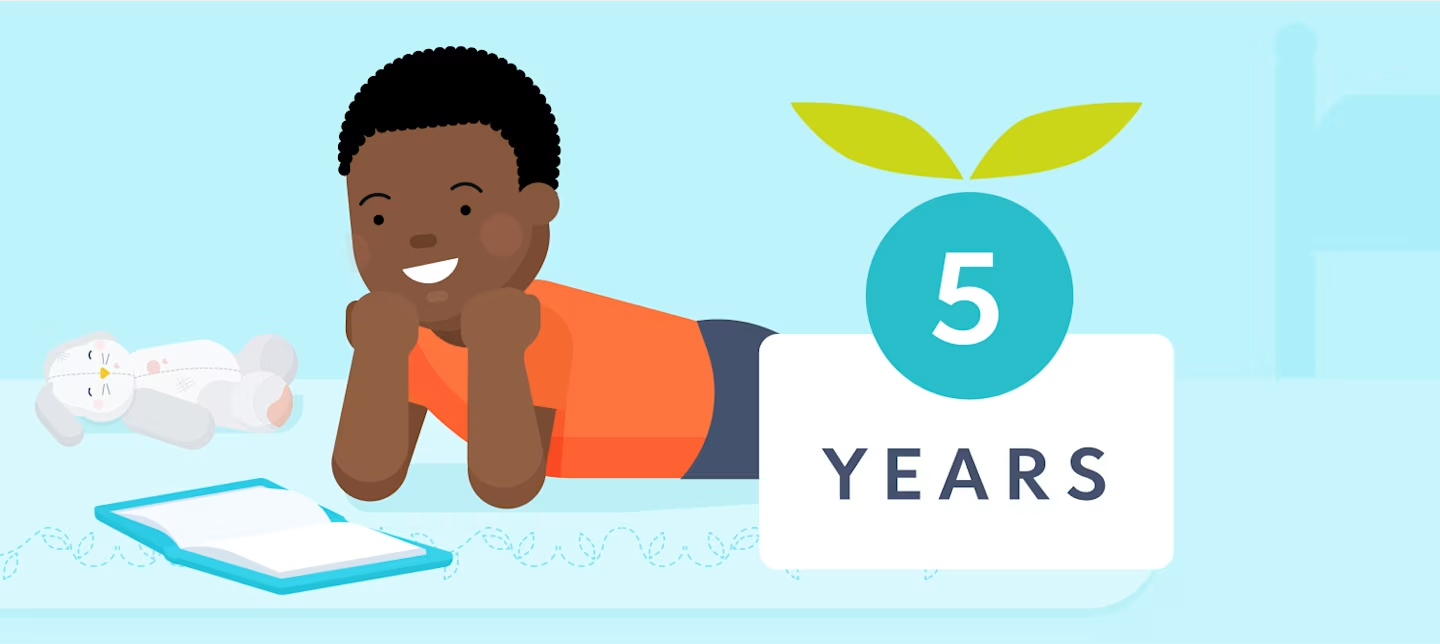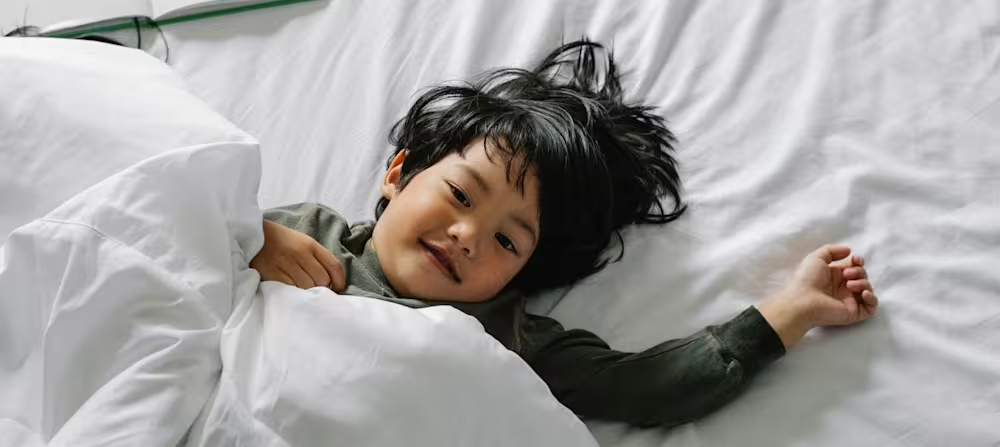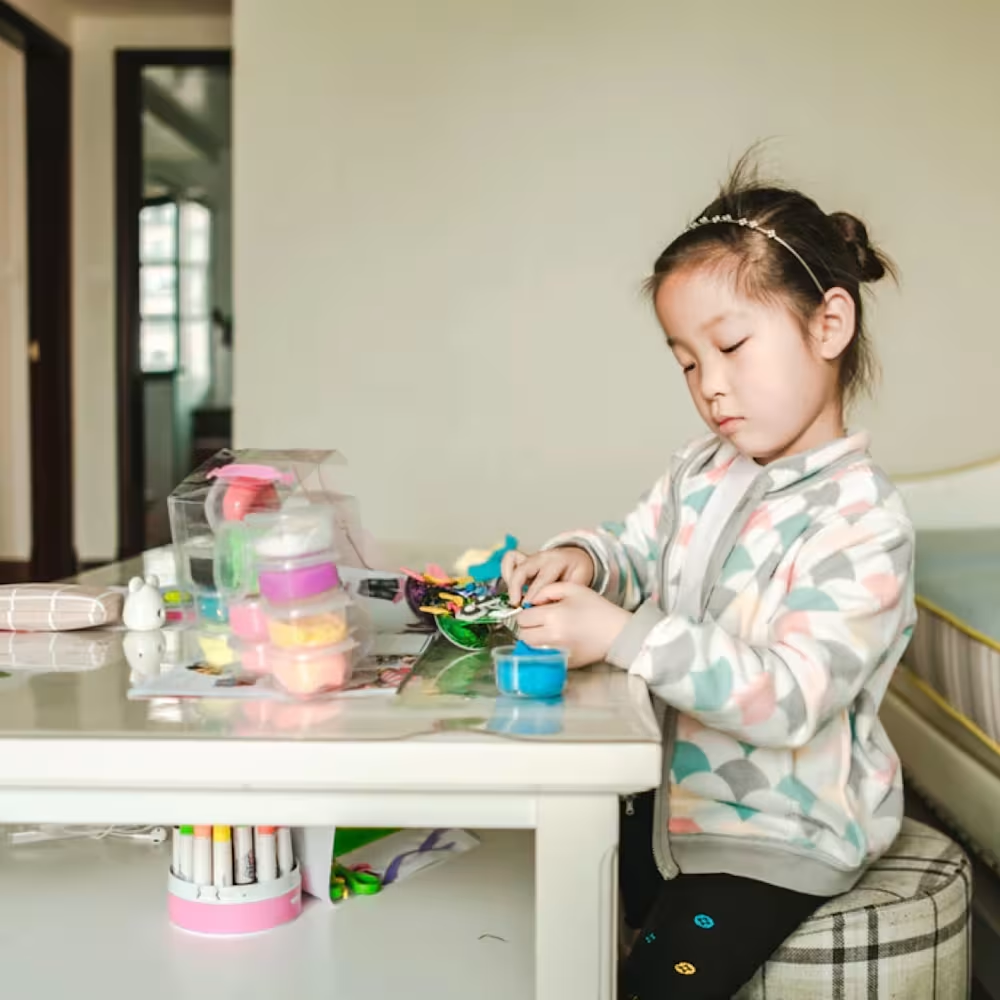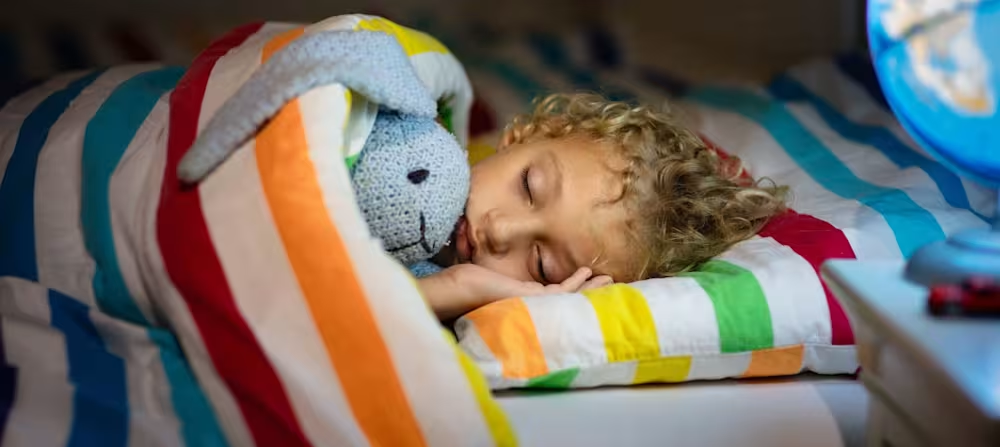How much sleep do 5 year olds need: Kindergartener sleep needs
Updated Oct 16, 2025

Sending your child to kindergarten can stir up all kinds of emotions — joy, excitement, and maybe some anxiety too. While we can’t help your kiddo memorize those sight words or teach them to tie their shoes, we can help you ensure they get enough sleep to set them up for success — emotionally, socially, and academically.
How much should a kindergartener sleep?
The American Academy of Pediatrics (AAP) recommends 10 - 13 hours of sleep in a 24-hour period for 3 - 5 year olds []. However, there’s no shortage of opinions on the matter. While it can be tempting to focus on a particular number of hours, we encourage you to consider other factors when determining whether your child is getting enough sleep []. Here are some ways you can gauge:
Signs your school-aged child isn’t getting enough sleep
Falling asleep spontaneously (i.e. during short car trips, or at mealtimes) or having excessive daytime sleepiness
Sleeping later on non-school days to “make up” for lost sleep
Exhibiting behaviors linked to overtiredness in the evenings, such as increased moodiness, whininess, or hyperactivity
Signs your school-aged child is getting sufficient sleep
Naturally waking at desired times on non-school days (without an alarm clock or parent waking them)
No longer needing naps at 5 years of age or older
Appearing well-rested throughout the day and into the early evening
Hours needed for adequate sleep
We get it — you still want to see the numbers. It’s important to note that sleep ranges vary, and you shouldn’t go by the number of hours slept alone. You’ll want to monitor your child’s mood and energy levels, while keeping in mind that the recommended hours are a general guide.
The American Academy of Sleep Medicine (AASM) says 3 - 5 year old kids should get 10 - 13 hours of sleep, and 6 - 12 year old kids should get 9 - 12 hours []. These ranges are supported by the American Academy of Pediatrics (AAP) [] but are so broad that they may not be particularly helpful if you’re wondering exactly how many hours your 4 - 6 year old kindergartener needs.
A 2012 systematic review [] of 34 studies looked at the average amount of sleep among narrower age groups. They found that 4 - 5 year olds averaged 11.5 hours of sleep in a 24-hour period, while 6 year olds sleep needs averaged 9.7 hours of sleep.
At Huckleberry, we find that most kindergartners need an average of 10 - 12 hours of sleep in a 24-hour period depending on their age. Younger kids who start school at 4 years of age may need 12 hours of total sleep, while a 6 year old may be well rested with 10 hours of night sleep. Again, view these recommendations as a general guideline — not as a strict rule for all kids. Some children may need more sleep, and some may need less.
Hours of sleep kindergarteners need by age
Note: Sleep needs vary by child, and this chart should be viewed as an example.
Health benefits of sleeping for a kindergartener
According to the AAP, kids who get adequate sleep perform better in school as well as have healthier immune systems, behavior, and mental health. Research [] supports that sleep is especially important when it comes to learning and memory function. Children who don’t get enough sleep are at greater risk [] of developing health, behavior, and attention problems which can negatively impact school performance.
Common sleep issues for kindergarteners
While school-aged children tend to sleep better than babies and toddlers, they may still experience sleep challenges at this age. They can include:
Insufficient sleep
Stalling and/or resisting bedtime
Night wakings
Nightmares
Medical issues, such as obstructive sleep apnea []
5 tips and tricks for getting your kindergartener to sleep well
Here are some tips for helping your kindergartner get the sleep they need:
Set an age-appropriate bedtime
Opt for early bedtimes instead of naps
Turn off screens an hour before bedtime
Maintain a calm bedtime routine
Begin the night the way you want it to end
Find more details below:
Tip #1: Set an age-appropriate bedtime
Bedtimes will vary between different school-aged children. You’ll want to establish a regular bedtime that allows your child to get enough nighttime sleep (usually a minimum of 10 hours) and wake up refreshed with plenty of time to get ready for school. A bedtime that’s too late can lead to insufficient sleep, which often translates into trouble waking in the morning and daytime sleepiness.
Children who are overtired also tend to have more nightmares and night terrors, so getting a sufficient amount of sleep can help reduce these sleep disruptors. A word of caution: Don’t go overboard on the early bedtimes. While we want to ensure bedtime for kindergarten is early enough, we don’t want to set it too early as that can lead to issues like stalling at bedtime or early waking. For example, if your child is used to going to bed at 7:30 PM, 6:00 PM may be too early for their internal clock, even if they seem sleepy. Instead, try meeting in the middle and aim for a 6:45 - 7:00 PM bedtime.
Tip #2: Opt for early bedtimes instead of naps
School can be exhausting for kids, especially those adjusting to longer days away from home. If your kindergartener is falling asleep on the couch after school, it could be a sign that they need more sleep. We recommend avoiding after school naps, as they can push bedtime too late and create a cycle of insufficient sleep. Try moving bedtime a bit earlier instead. Even 30 minutes of extra sleep can make it easier for little kids to remain well-rested throughout the day.
Tip #3: Turn off screens an hour before bedtime
We understand. It can be hard to say “no” to chilling out and watching a show at the end of a long day with your little one. We don’t want to sound like the screen police. However, blue light emanating from tablets, television, and smartphones suppresses melatonin (the hormone which helps control the sleep-wake cycle) and inhibits sleepiness.
In other words, for most kids, it’s best to shut those devices off well before bedtime. Keeping them on before bedtime can impact your child’s circadian rhythm and make it harder for them to fall asleep. There’s evidence [] that even short durations of blue light impact children far more than adults.
Tip #4: Maintain a calm bedtime routine
Consistent bedtime routines help children fall asleep more easily and improves the overall quality of sleep []. for instilling healthy hygiene habits, bonding with your child, and building communication skills through songs, reading, and/or talking.
Tip #5: Begin the night the way you want it to end
Use bedtime to set the habits you’d like to continue throughout the night. If your goal is for your child to sleep alone in their own bed for the entire night, then work on ensuring that they fall asleep that way at bedtime too (if you haven’t already).
When a child is used to falling asleep independently at bedtime, it often translates into falling back to sleep throughout the night. That means they’ll be more likely to fall back to sleep on their own after a brief awakening, rather than call out for your help (or stand next to your bedside staring at you until you open your eyes). That can mean better sleep for the entire family.
Why does my 5 year old keep waking up at night?
If your 5 year old had been sleeping well then suddenly begins waking overnight again, factors that may be at play include:
Life changes (like starting kindergarten or welcoming a sibling)
Nightmares/night terrors
Travel
Overtiredness
Developmental milestones
When kiddos start school or experience other big life changes, it’s common for sleep to be (temporarily) disrupted. If you’re looking for more sleep support, consider submitting for a personalized, step-by-step Sleep Plan via .
Is there a sleep regression at 5 years old?
There isn’t a date to mark on the calendar that will determine if your child will go through a sleep regression at 5. Instead, factors like we discussed above (starting school, being overtired, nightmares) may contribute to a decline in sleep patterns at this age. It’s an exciting and overwhelming time for kiddos — and you may be feeling similar emotions as their parent too!
Can I sleep train a 5 year old?
Yes, you can sleep train a 5 year old! At this age, the approach often focuses more on setting clear expectations, using consistent routines, and reinforcing positive behaviors rather than traditional methods used with babies or toddlers. With consistency and patience, most kids this age can learn healthy sleep habits.
If you’d like personalized support, we can help you create a plan tailored to your child’s needs and challenges with .
What are the developmental milestones for a 5 year old?
, you may notice your child is able to do things like carry a conversation, dress themselves, write some letters, and is ready to take on the world (aka kindergarten). They’ve accomplished so much already in half a decade! Here are more things your kiddo may be learning and doing at this age:
Stay balanced while standing on one foot with eyes closed
Hop on one foot
Ride a bike (with or without training wheels)
Use eating and writing utensils with precision
Draw a “person” with a few body parts
Write some uppercase and lowercase letters
Dress and undress themselves (with help tying shoelaces etc.)
Keep a conversation going with three or more back-and-forth exchanges
Talk in complete sentences consisting of 5+ words
Tell stories
Count to 10 and count 10+ objects
Name some numbers and letters
Correctly name 4+ colors
Takeaway
When determining if your kiddo is getting enough sleep, look for signs such as falling asleep spontaneously or exhibiting behaviors linked to overtiredness (e.g. crankiness, melt downs).
We recommend aiming for average of 10-11 hours of sleep in a 24-hour period for 5 year olds, but each child is different. It’s OK if your kiddo requires more or less sleep than this.
Tips for helping your kindergartener sleep include setting an age-appropriate bedtime, avoiding naps in favor of early bedtimes, turning off screens an hour before bedtime, maintaining a calm bedtime routine, and setting habits at bedtime that you want to continue throughout the night.
Remember, these are general guidelines, and every child is unique. It's important to observe your child's behavior, sleep patterns, sleep challenges, and mood to ensure they’re getting the right amount of sleep for their individual needs.
Remember, these are general guidelines, and every child is unique. It's important to observe your child's behavior, sleep patterns, any type of sleep problem, and mood to ensure they are getting the right amount of sleep for their individual needs.
Share article:
Note: The content on this site is for informational purposes only and should not replace medical advice from your doctor, pediatrician, or medical professional. If you have questions or concerns, you should contact a medical professional.
10 Sources
Share article:







